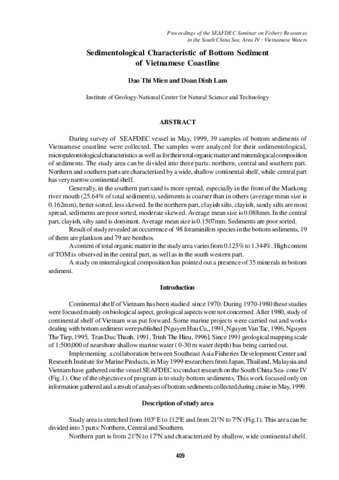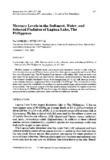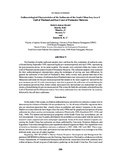| dc.contributor.author | Chareonpanich, Charumas | |
| dc.contributor.author | Seurungreong, Siriporn | |
| dc.date.accessioned | 2018-12-06T07:53:34Z | |
| dc.date.available | 2018-12-06T07:53:34Z | |
| dc.date.issued | 1999 | |
| dc.identifier.citation | Chareonpanich, C., & Seurungreong, S. (1999). Some physical and chemical characteristics of bottom sediments in the South China Sea, Area I: Gulf of Thailand and east coast of Peninsular Malaysia. In Proceedings of the First Technical Seminar on Marine Fishery Resources Survey in the South China Sea, Area I: Gulf of Thailand and Peninsular Malaysia, 24-26 November 1997, Bangkok, Thailand (pp. 12-33). Samutprakan, Thailand: Training Department, Southeast Asian Fisheries Development Center. | en |
| dc.identifier.uri | http://hdl.handle.net/20.500.12067/776 | |
| dc.description.abstract | Investigations on horizontal and vertical distribution in levels of total organic matter contents (TOM), acid volatile sulfides contents (AVS), and water contents (WC) of bottom sediments from the eastern and western parts of the Gulf of Thailand and the eastern part of the Peninsular Malaysia have been carried out during 5-28 September 1995 and 24 April to 17 May 1996 by M.V. SEAFDEC. The overall results indicated comparatively low amount of organic matters and sulfides deposited in the sediments. Considering on the vertical profiles, coupled efforts of low rate of sedimentation of the organic matters and high rate of their decomposition should play an important role providing fast diagenesis of their organic substances. Nevertheless, the particulate matters which had settled onto the sea bed and formed the sediments can be remarkably observed to accumulate in two major zones in the Gulf of Thailand; one in the central part of the upper gulf (around Station 7) and another one in the western part of the gulf, near Samui Island (around Station 23). Such an accumulation pattern was considered to be directly controlled by the bottom topography and current effort. The accumulation of organic materials there also implied the mode of biological fishery resources. High abundant of organisms in the benthic community should be observed. Moreover, according to biogeochemical interaction between the sediment-water interface, phytoplankton production in the overlying water column should be enhanced and, consequently, a congregation of organisms in the upper trophic levels especially those of fish species were accordingly expected. Future assessment for development of the fishery resources in the Gulf of Thailand and the eastern part of Peninsular Malaysia has been discussed. | en |
| dc.language.iso | en | en |
| dc.publisher | Training Department, Southeast Asian Fisheries Development Center | en |
| dc.subject | South China Sea | en |
| dc.subject | Gulf of Thailand | en |
| dc.subject | Malaysia | en |
| dc.title | Some Physical and Chemical Characteristics of Bottom Sediments in the South China Sea, Area I: Gulf of Thailand and East Coast of Peninsular Malaysia | en |
| dc.type | Conference paper | en |
| dc.citation.spage | 12 | |
| dc.citation.epage | 33 | |
| dc.subject.asfa | biogeochemical cycle | en |
| dc.subject.asfa | organic matter | en |
| dc.subject.asfa | phytoplankton | en |
| dc.subject.asfa | sedimentation | en |
| dc.subject.asfa | trophic levels | en |
| dc.subject.asfa | sediment analysis | en |
| dc.subject.asfa | vertical profiles | en |
| dc.subject.asfa | benthos | en |
| dc.citation.conferenceTitle | Proceedings of the First Technical Seminar on Marine Fishery Resources Survey in the South China Sea, Area I: Gulf of Thailand and Peninsular Malaysia, 24-26 November 1997, Bangkok, Thailand | en |



